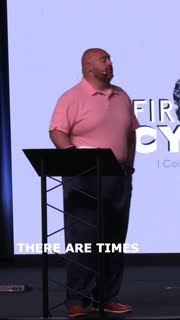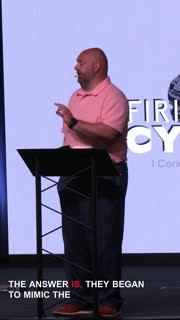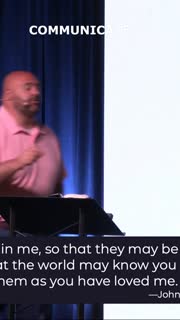Unity in Christ: Overcoming Division in the Church
Summary
### Summary
In today's sermon, we delved into 1 Corinthians chapter 1, focusing on the theme of unity within the church. Drawing a parallel between a malfunctioning car and a church that isn't "firing on all cylinders," we explored how the Apostle Paul, like a master mechanic, diagnoses the issues within the Corinthian church. The primary problem Paul identifies is the church's tendency to mimic the surrounding culture, leading to disunity and division. Corinth, a city known for its pluralistic society and the worship of Aphrodite, had allowed cultural sins to infiltrate the church, causing it to stray from its intended purpose.
Paul's letter to the Corinthians serves as a case study for us today, emphasizing the importance of maintaining unity to fulfill our mission as a church. He highlights that Jesus Himself prayed for our unity, desiring that we be one as He and the Father are one. This unity is not just about agreement on doctrine but also about being of the same mind and judgment, striving together for the same mission.
We examined the specific issues causing division in Corinth, such as cliques and factions, and how these can manifest in modern churches. Paul urges us to resolve conflicts biblically and to avoid elevating leaders to pedestals, which can lead to unhealthy comparisons and divisions. Instead, we should celebrate the unique gifts of each leader and work together as a team.
Ultimately, our identity in Christ and our mission to preach the gospel should be the unifying factors that guide our actions and relationships within the church. By focusing on these, we can ensure that we are a healthy, vibrant church that brings glory to God.
### Key Takeaways
1. Unity as a Default Setting: Unity should be the default aspiration of the church. This means striving for agreement on essential doctrines and the church's mission. When unity is our goal, we will take the necessary steps to maintain it, ensuring that we are of one mind and judgment. [12:21]
2. Avoiding Cliques and Factions: Cliques and factions can erode the unity of the church. Biblical friendship is always inviting and open, not exclusive. We must be careful not to form groups based on shared opinions that exclude others, as this can lead to division and disunity. [18:48]
3. Resolving Conflict Biblically: A healthy church addresses conflicts head-on, using biblical principles to resolve them. Ignoring issues can lead to deeper divisions and a breakdown of unity. We must be proactive in addressing and resolving conflicts to maintain a healthy church environment. [22:13]
4. Celebrating Diverse Leadership: Each leader in the church brings unique gifts and strengths. Instead of comparing and contrasting leaders, we should celebrate their diversity and the different roles they play in the church. This helps to prevent divisions based on personal preferences. [33:15]
5. Identity in Christ and the Gospel: Our unity is rooted in our shared identity in Christ and our mission to preach the gospel. When we focus on these core aspects, we can overcome personal differences and work together effectively. This alignment with our Master and mission ensures true biblical unity. [39:50]
### YouTube Chapters
[0:00] - Welcome
[01:19] - Diagnosing Church Issues
[02:11] - Paul's Letter to Corinth
[03:32] - Mimicking Culture
[04:05] - Corinth's Pluralistic Society
[05:23] - Infiltration of Cultural Sins
[06:51] - Disunity and Division
[07:24] - Jesus' Prayer for Unity
[08:27] - Unity in Doctrine and Mission
[10:12] - Paul's Appeal for Unity
[11:51] - Unity as a Default Setting
[12:51] - Addressing Divisions
[14:21] - Authority of Jesus Christ
[18:48] - Avoiding Cliques and Factions
[22:13] - Resolving Conflict Biblically
[25:00] - Quarreling and Strife
[27:56] - Popularity Contests Among Leaders
[33:15] - Celebrating Diverse Leadership
[39:50] - Identity in Christ and the Gospel
[41:04] - Evaluating Unity in the Church
[42:14] - Conclusion and Call to Unity
Study Guide
### Bible Study Discussion Guide
#### Bible Reading
1 Corinthians 1:10-17 (ESV)
#### Observation Questions
1. What specific issues did Paul identify as causing disunity in the Corinthian church? ([10:44])
2. How does Paul describe the type of unity Jesus prayed for in John 17? ([07:59])
3. What were the different factions or cliques mentioned in the Corinthian church, and what were they based on? ([10:44])
4. According to the sermon, what are some modern examples of cliques and factions within churches today? ([18:18])
#### Interpretation Questions
1. Why does Paul emphasize the importance of unity being the default setting for the church? How does this relate to the church's mission? ([12:21])
2. How can celebrating diverse leadership within the church help prevent divisions? What are the potential dangers of comparing leaders? ([33:15])
3. What does it mean to resolve conflicts biblically, and why is it crucial for maintaining a healthy church environment? ([22:13])
4. How does our shared identity in Christ and mission to preach the gospel serve as unifying factors within the church? ([39:50])
#### Application Questions
1. Reflect on your own experience in the church. Have you ever been part of a clique or faction? How did it affect your relationships with others in the church? ([18:48])
2. Think about a recent conflict you had within the church. Did you address it biblically? If not, what steps can you take to resolve it according to biblical principles? ([22:13])
3. How can you personally contribute to celebrating the unique gifts and strengths of different leaders in your church? Share a specific example of how you can do this. ([33:15])
4. In what ways can you ensure that your focus remains on your identity in Christ and the mission to preach the gospel, rather than on personal preferences or differences? ([39:50])
5. Evaluate your interactions within the church. Are there any behaviors or attitudes you need to change to promote unity? How can you start making those changes this week? ([12:21])
6. How can you be more inviting and open in your friendships within the church to avoid forming exclusive cliques? Share a practical step you can take to include others. ([18:48])
7. Discuss how you can hold church leadership accountable in a way that promotes unity rather than division. What specific actions can you take to support this? ([22:13])
Devotional
Day 1: Unity as a Default Setting
Unity should be the default aspiration of the church. This means striving for agreement on essential doctrines and the church's mission. When unity is our goal, we will take the necessary steps to maintain it, ensuring that we are of one mind and judgment. [12:21]
In 1 Corinthians 1, Paul emphasizes the importance of unity within the church. He points out that disunity and division arise when the church begins to mimic the surrounding culture rather than adhering to its foundational beliefs and mission. Unity is not merely about agreeing on every single point but about being of the same mind and judgment, striving together for the same mission. This unity is essential for the church to function effectively and fulfill its purpose.
Jesus Himself prayed for our unity, desiring that we be one as He and the Father are one. This unity is a reflection of the divine relationship and is crucial for the church to be a healthy, vibrant community that brings glory to God. When unity is our default setting, we will take proactive steps to maintain it, addressing any issues that arise and ensuring that we are all working towards the same goal.
Ephesians 4:3-6 (ESV): "Eager to maintain the unity of the Spirit in the bond of peace. There is one body and one Spirit—just as you were called to the one hope that belongs to your call—one Lord, one faith, one baptism, one God and Father of all, who is over all and through all and in all."
Reflection: Think about a recent disagreement or conflict within your church community. How can you take steps to promote unity and ensure that the church remains focused on its mission?
Day 2: Avoiding Cliques and Factions
Cliques and factions can erode the unity of the church. Biblical friendship is always inviting and open, not exclusive. We must be careful not to form groups based on shared opinions that exclude others, as this can lead to division and disunity. [18:48]
In the Corinthian church, cliques and factions were a significant source of division. These groups formed based on personal preferences and opinions, leading to an environment where some felt excluded and marginalized. This behavior is contrary to the biblical model of friendship, which is always inviting and open, never exclusive.
Modern churches can fall into the same trap if they are not vigilant. It is essential to foster an inclusive community where everyone feels welcome and valued. By avoiding the formation of cliques and factions, we can ensure that the church remains united and focused on its mission.
James 2:1-4 (ESV): "My brothers, show no partiality as you hold the faith in our Lord Jesus Christ, the Lord of glory. For if a man wearing a gold ring and fine clothing comes into your assembly, and a poor man in shabby clothing also comes in, and if you pay attention to the one who wears the fine clothing and say, 'You sit here in a good place,' while you say to the poor man, 'You stand over there,' or, 'Sit down at my feet,' have you not then made distinctions among yourselves and become judges with evil thoughts?"
Reflection: Reflect on your social interactions within the church. Are there any groups or cliques that you are a part of that might be excluding others? How can you make your friendships more inclusive and inviting?
Day 3: Resolving Conflict Biblically
A healthy church addresses conflicts head-on, using biblical principles to resolve them. Ignoring issues can lead to deeper divisions and a breakdown of unity. We must be proactive in addressing and resolving conflicts to maintain a healthy church environment. [22:13]
Conflict is inevitable in any community, including the church. However, how we handle conflict can either strengthen or weaken the unity of the church. Paul urges the Corinthians to resolve their conflicts biblically, addressing issues head-on rather than allowing them to fester and cause deeper divisions.
Ignoring conflicts can lead to a breakdown of unity and a toxic church environment. By following biblical principles for conflict resolution, such as seeking reconciliation, forgiveness, and understanding, we can maintain a healthy and united church community.
Matthew 18:15-17 (ESV): "If your brother sins against you, go and tell him his fault, between you and him alone. If he listens to you, you have gained your brother. But if he does not listen, take one or two others along with you, that every charge may be established by the evidence of two or three witnesses. If he refuses to listen to them, tell it to the church. And if he refuses to listen even to the church, let him be to you as a Gentile and a tax collector."
Reflection: Think of a conflict you are currently facing within your church community. How can you apply biblical principles to address and resolve this conflict in a way that promotes unity and reconciliation?
Day 4: Celebrating Diverse Leadership
Each leader in the church brings unique gifts and strengths. Instead of comparing and contrasting leaders, we should celebrate their diversity and the different roles they play in the church. This helps to prevent divisions based on personal preferences. [33:15]
In the Corinthian church, there was a tendency to elevate certain leaders above others, leading to unhealthy comparisons and divisions. Paul addresses this issue by emphasizing the importance of celebrating the unique gifts and strengths of each leader. Every leader has a different role to play in the church, and their diversity should be seen as a strength rather than a source of division.
By celebrating diverse leadership, we can prevent divisions based on personal preferences and ensure that the church remains united. Each leader's unique contributions are valuable and necessary for the church to function effectively and fulfill its mission.
1 Corinthians 12:4-6 (ESV): "Now there are varieties of gifts, but the same Spirit; and there are varieties of service, but the same Lord; and there are varieties of activities, but it is the same God who empowers them all in everyone."
Reflection: Reflect on the leaders in your church. How can you celebrate their unique gifts and contributions? Are there any ways you can support and encourage them in their roles?
Day 5: Identity in Christ and the Gospel
Our unity is rooted in our shared identity in Christ and our mission to preach the gospel. When we focus on these core aspects, we can overcome personal differences and work together effectively. This alignment with our Master and mission ensures true biblical unity. [39:50]
The foundation of our unity as a church is our shared identity in Christ and our mission to preach the gospel. When we focus on these core aspects, we can overcome personal differences and work together effectively. Our identity in Christ unites us, and our mission to spread the gospel gives us a common purpose.
By aligning ourselves with our Master and mission, we can ensure true biblical unity. This focus helps us to rise above personal preferences and disagreements, working together to fulfill the purpose that God has given us as a church.
Colossians 3:12-14 (ESV): "Put on then, as God's chosen ones, holy and beloved, compassionate hearts, kindness, humility, meekness, and patience, bearing with one another and, if one has a complaint against another, forgiving each other; as the Lord has forgiven you, so you also must forgive. And above all these put on love, which binds everything together in perfect harmony."
Reflection: How does your identity in Christ influence your interactions with others in your church? What steps can you take to ensure that your focus remains on the mission to preach the gospel and maintain unity within the church?
Quotes
1. "There are times in a church, because we're sinners and because we're filled with lots of our own personal preferences and desires, that it's easy as a church at times to allow the maintenance of being a healthy and vibrant church to get out of whack. And lights start flashing or maybe smells start to come or rattling or clanks begin to happen in the ongoing operation of the church." [01:19] (26 seconds)
2. "The answer is, they began to mimic the culture that they were living in. And that's a temptation and a tendency for churches in the 21st century and for us at Village Bible Church because let's just be honest, the majority of our time that we live as Christians are lived in the world, not together, not worshiping, not fellowshipping together. We're out in our workplaces and in our communities and in our schools where culture rules the day." [03:32] (31 seconds)
3. "The way we communicate that we are Christians is through unity. The world's filled with division. Marriages end in divorce. Organizations break up. Sports teams fall apart because of disunity. People break up all the time and friendships and all that. But that shouldn't be the case of the church because we want to answer the Lord's prayer of being one in Christ as we are one in one another." [09:35] (33 seconds)
4. "The way that we pursue unity is by loving as Jesus Christ did. This is what Paul wants the church at Corinth to live out. Now, he was preaching this and proclaiming this long before the book or the movie or any of the storyline of the three musketeers comes where the three musketeers motto is all for one and one for all. And this idea of this fidelity to the greater is one that should be a calling card and motto for us in the church." [10:12] (39 seconds)
5. "To be a part of a local church is an agreement that we're all going to agree to agree, at some point. That at some point, you call Village Bible Church your home, the church of Corinth your home, you're going to agree with things. Well, what does that mean? There's a lot of things that would be really hard for us to agree about. Paul's talking about doctrinal unity. He'll talk about this later in the letter. But doctrinal unity, unity in the essentials." [16:01] (29 seconds)
6. "So be careful when you have certain feelings, opinions, thoughts, and ideas that you don't just go and find people that agree with you. People that resonate with you. That agree and start to embolden you to push even harder. And this is where we've got to be careful. Because what we will do is we will say if someone isn't this then they're not a Christian. If a person isn't dot, dot, dot then they can't be a Christian. And that's a problem." [21:47] (35 seconds)
7. "You cannot embrace that person in a wrestling match while you're embracing Jesus. So to do that, you've got to let go of your embrace of Jesus to take hold of the other person. You have to stop being close to Jesus and get close to the other person because it's hand-to-hand grappling. This is the word quarreling. You're up close and you're personal. You're fighting. You're embracing. You're taking hold of. So you cannot take hold of the conflict and take hold of Jesus at the same time." [26:11] (32 seconds)
8. "Be in the habit of celebrating the uniqueness of each of your leaders. Each of your pastors. For those who have been around Village and have deep relationships with different pastors at our church, there's good reason why. We've got great leaders here. Let's talk about Pastor Keith. Pastor Keith, I've got to be honest, I don't know if there's anybody who cares more about people than Pastor Keith. Pastor Keith cares so much about what concerns you, he will reply to your email before you even email him." [33:15] (35 seconds)
9. "Our identity in Christ and our identity in the gospel will always bring us to unity. Our identity in Christ is He is our Lord and Savior Jesus Christ. He's our Master. And so my identity is He's Master, I am slave. He is Master, I am servant. He is teacher, I am student. What He says, I do. And if we can all get there, we'll have the same Master. That's the first bookend. The second bookend in verse 17 is our mission. Our mission isn't to elevate self. It isn't to pursue personal preferences or personal desires." [40:28] (46 seconds)
10. "Jesus takes unity very seriously. He prayed for it. He longs for it in his people and now Paul urges us and appeals to us on the name of Jesus Christ that beautiful name you that you and I would be of the same mind the same heart the same focus and attention that it might serve us good and bring God great glory amen." [42:14] (23 seconds)










